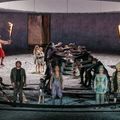
A friend and colleague recently asked me for suggestions about good plays that could be produced in Budapest. Naturally, she was thinking of pieces that have been translated to Hungarian, if that is not the original language. I had some fun compiling this list for her, starting with the Hungarian works I would like to see on the stage. (Photo from a production of Skin of Our Teeth)
Elvezett paradicsom [Lost Paradise] (1961)
Successful Kádár-Era screenwriter Imre Sarkadi takes a rosy look at life in the countryside. The play is like a time capsule, very slow and gentle with a melancholy sense that this fragile order cannot last. No one from the younger generation seems fit to take over the role of the wise patriarch Sebők; and his most intelligent son, the doctor Zoltán, must face the consequences for a botched illegal abortion.
Ezer év [One Thousand Years] (1955)
Novelist Ferenc Karinthy (son of even more famous Frigyes Karinthy) penned this play, which is a curiosity now. The first half is a timeless story of a bad romance, when Anna is dumped by her married lover just after realizing she is pregnant. The second half is a trial and investigation of the resulting attempted abortion / child murder, run by a judge, prosecutor, and detective at the scene of the crime with all the participants. They strictly address each other as comrade [elvtárs] and briefly discuss the Communist worldview, which makes it a fascinating peek at that oppressive era, shortly before the revolution.
Both plays of these Hungarian plays are good, but are modern audiences at all interested in this period? Maybe it is too recent to be fascinating. Or maybe they would prefer to forget about it.
Here are my recommendations for non-Hungarian plays in a mostly random order.
Tiny Alice by Edward Albee
There is a Hungarian translation of this, although that is no guarantee that it does justice to the original. Perhaps my favorite play by Albee, it presents an odd Twilight Zone attack on organized religion, but it is rarely performed.
The House of Bernardo Alba by Frederico Garcia Lorca
I love this play. Spirit Theatre has just revived it, as did the now nonexistent Budapest Kamraszínház (Chamber Theatre) around ten years ago, but neither was able to evoke the piece’s poetry or fearsome menace.
Devotion to the Cross by Calderon de la Barca
This work by Calderon is loony as a lark and practically never staged. It is the tale of an anti-saint who, despite his sins, often benefits from miracles and divine intervention. He cannot marry the woman he loves, so he fights a duel, becomes a bandit, then breaks into a convent in order to spend one night of passion with his beloved. Still, he cannot consummate the deed, because he nearly loses his mind when he sees a birthmark (identical to his) on her body. Eventually, it is revealed that they are twin siblings separated at infancy. The style is over-the-top romanticism – like Schiller’s The Robbers, but with a distinctly Spanish feel.
The Trickster of Seville and His Guest of Stone by Tirso de Molina
On the subject on Spanish drama, why not do the original play about Don Juan? It is better than all the copies (even the Mozart opera), and practically no one knows it.
The Marriage of Figaro by Beaumarchais.
Speaking of operas, the original Beaumarchais play is, in my opinion, one of the funniest comedies ever written. They did it about 13 years ago at Centrál Theatre, but were unable to deliver the humor.
Juno and the Paycock by Sean O'Casey
This can be a very moving drama. (I saw a fine production once in New York.) There are several roles for good actors. It also has a very modern way of mixing drama with comedy. The play concludes with a comic scene of the husband’s drunkenness, just after Juno, his wife, learns about the tragic death of their son.
Liola by Luigi Pirandello
This play is very uncharacteristic of Pirandello – no philosophy, just pleasant comedy with a dose of heavy melodrama. The protagonist Liola is an incorrigible rogue and a Don Juan. I have never heard of anyone staging it!
Lysistrata by Aristophanes
Isn’t it always a good time for Lysistrata?
Hecuba by Euripides
While we are on Ancient Greek drama, it is worth considering this rarely revived piece by Euripides. In his sequel to The Trojan Women, Hecuba is being taken by ship to Greece, where she will be a slave in some noble household. Yet, when they stop at an island where she believes that she has safely hidden her son (her last surviving child), she learns that she has been tragically double-crossed. In her desire for revenge, she loses all humanity. This would be a great role for a talented older actress.
Phaedra by Jean Racine or The Infernal Machine by Jean Cocteau
These are two adaptations of Ancient Greek tragedy by French writers. Racine is much more classical in his approach (beautiful speeches). Cocteau’s work is rather a respectful deconstruction of Oedipus. Who knows? Audiences liked Orestes at the Radnóti. Why not take a try on one of these works?
La Ronde by Arthur Schnitzler
This classic sex comedy set in Vienna inspired an enchanting French film adaptation directed by Max Ophüls. I would love to see a good production of it someday.
The Marriage of Bette and Boo by Christopher Durang
Of all Christopher Durang’s work, I think this one mixes comedy and sadness the most brilliantly. We watch the breakdown of an unsuccessful marriage through the eyes of the son as he grows up and struggles to make sense of his parents’ dysfunction.
Major Barbara by George Bernard Shaw
In my opinion, this is the most thought-provoking of G. B. Shaw’s plays. It boasts a very strong idealistic heroine who becomes cruelly disillusioned. The long debate at the end about the morals of profiteering from war is still troubling and topical.
Little Murders by Jules Feiffer
I am not sure if this play would speak to a Hungarian audience. A nihilistic artist (who has successful exhibitions which are entirely his photos of feces) finds new meaning in life through the efforts of his optimistic fiancée, just before she is killed in a random shooting. The grieving family members eventually surrender to the spirit of senseless violence.
Arcadia by Tom Stoppard
Has this ever been done in Hungary? Stoppard’s play is beautiful and philosophical. It also takes a very optimistic view of the world and history, which is refreshing.
Easter by August Strindberg
I am fond of this Strindberg play, as it maintains a delicate balance between naturalism and fantasy, like Scandinavian magic realism. No one ever stages it.
The Revenger's Tragedy by Cyril Tourneur
This is practically a spoof of revenge tragedies (think Spanish Tragedy or Hamlet). Tourneur has all the tropes we love along with a simplified plot full of sex and violence.
The White Devil by John Webster
Staying within this period, we find Webster, one of the most powerful and sensational playwrights of all time. Although he is overshadowed by Shakespeare, his plays are still brutally effective. This complicated revenge tragedy packs in plenty of violence, sex, and intrigue, as well as some unforgettably horrific moments.
The Changeling by Thomas Middleton (with William Rowley)
An amazing psychodrama from the Jacobean period. Truly scary.
Volpone by Ben Jonson
This is a challenging comedy, but it has plenty of great moments for talented performers. (There must be a Hungarian version. I saw Tamás Major playing the lead role on television, but he could not really embody the trickster anti-hero.)
The Country Wife by Wiliam Wycherly
Restoration comedy can be difficult to bring to the modern audience. (The József Katona Theatre was unsuccessful with Congreve’s Way of the World a few years ago.) Still, I would love to see someone stage The Country Wife, simply because it is the most brutal, savage, and ribald example of the genre. This is satire with teeth!
The Skin of Our Teeth by Thorton Wilder
Speaking of teeth, this piece by Wilder is sublimely weird and oh, so different from his sentimental tone in Our Town. A Hungarian translation already exists. Maybe it would seem dated now, but it is absolutely unique.
Lemon Sky by Lanford Wilson
I am not sure if this family drama from 1970 would strike a chord with modern Hungarians, but it is a very personal examination of the normal suburban family (which many modern citizens aspire to). Abandonment and the longing for love seem to be the major themes, along with all the dysfunction that can lurk behind the picture-perfect surface.
Search and Destroy by Howard Korder
A distinctly 1980s American atmosphere hangs over this piece by Korder. The protagonist is an idealistic loser who learns that to be successful he must become a criminal and an asshole.
In the current theatrical climate in Hungary, theatres seem to choose from a rather limited range of plays. After all, how many productions of Seagull, As You Like It, and Woyzeck do we really need? Allow this to be my contribution to theatrical diversity. In fact, the possibilities are limitless. Perhaps they can begin staging the plays that I have written!
A bejegyzés trackback címe:
Kommentek:
A hozzászólások a vonatkozó jogszabályok értelmében felhasználói tartalomnak minősülnek, értük a szolgáltatás technikai üzemeltetője semmilyen felelősséget nem vállal, azokat nem ellenőrzi. Kifogás esetén forduljon a blog szerkesztőjéhez. Részletek a Felhasználási feltételekben és az adatvédelmi tájékoztatóban.




